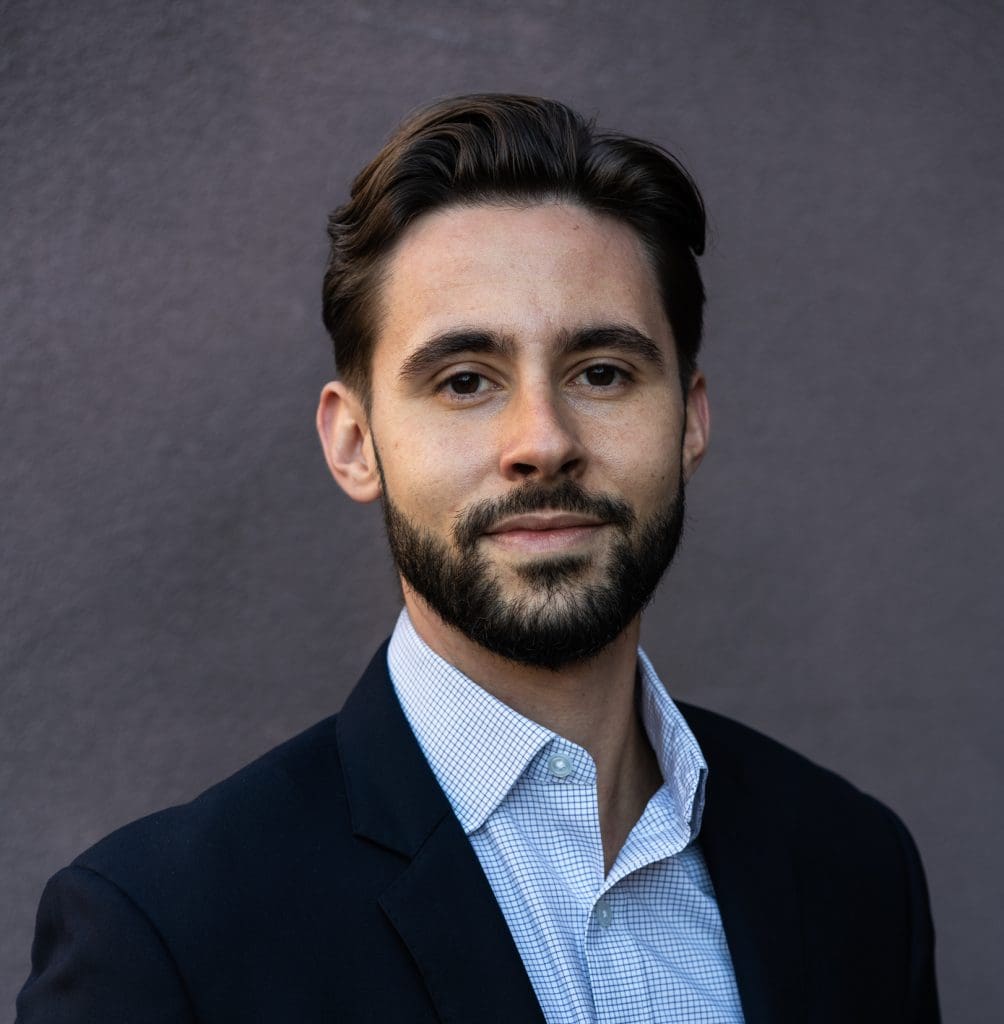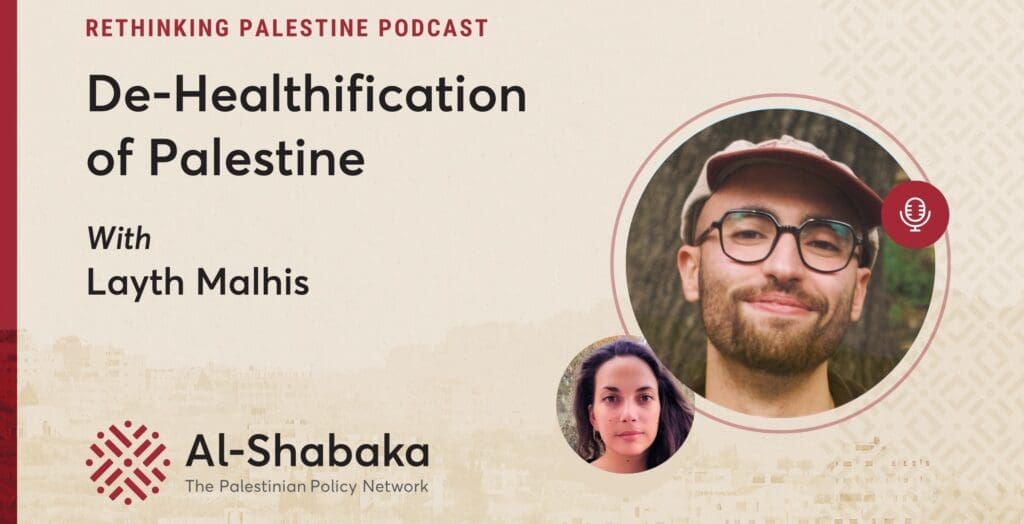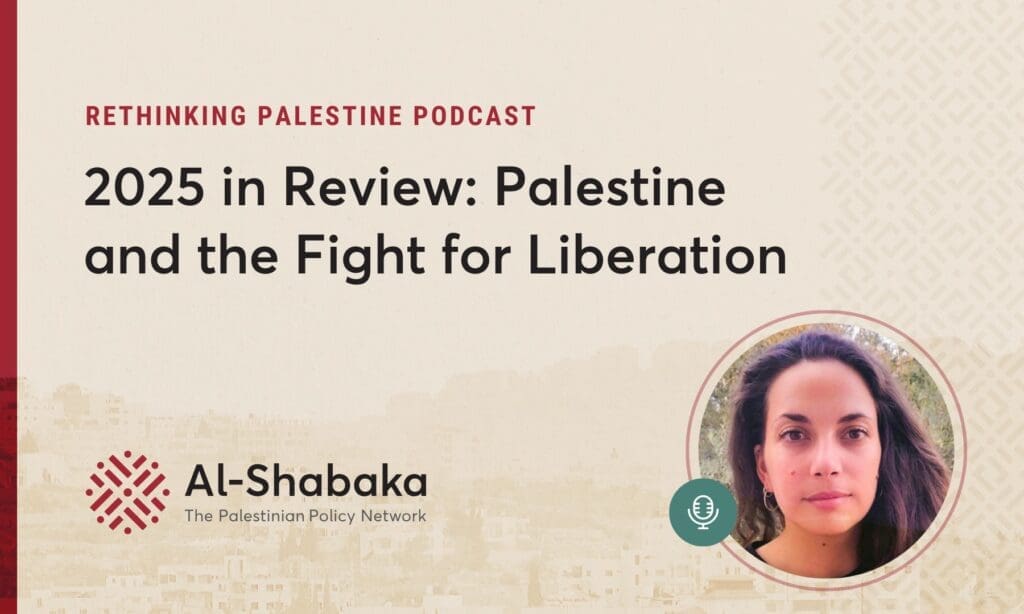About This Episode
Episode Transcript
The transcript below has been lightly edited for brevity and clarity.
Tariq Kenney-Shawa 0:00
Both journalists and open source intelligence analysts have essentially abandoned their objectivity and critical analysis to effectively act as spokespeople for the Israeli military. And in doing so, they’ve not only betrayed public trust, but they’re also playing a really important role in justifying Israeli war crimes in Gaza right now, and ultimately helping Israel get away with actual genocide.
Yara Hawari 0:29
From Al-Shabaka, the Palestinian Policy Network, I am Yara Hawari, and this is Rethinking Palestine.
Throughout the ongoing genocide in Gaza, which has so far claimed the lives of over 35,000 people, many of whom are children, we have seen how information and disinformation is an incredibly powerful weapon that can be utilized to dehumanize, to justify horrific violence, and to delegitimize Palestinian voices and experiences.
Indeed, following Hamas’s operation on October 7th, hysteria paved the way for horrific fabrications and mass dehumanization of Palestinians in Gaza. Journalists across the board failed to uphold even the most basic tenets of journalistic practice and fact-checking, instead regurgitating Israeli official narratives and language purposely designed to justify the mass violence that was to follow.
Other actors emerged online claiming to challenge and debunk false narratives. The online space has now become so saturated with information that many have found it hard to discern between reality and Israeli propaganda.
Joining us to discuss this some more is Tariq Kenney-Shawa, Al-Shabaka’s US Policy Fellow. Tariq, thank you for joining us on this episode of Rethinking Palestine.
Tariq Kenney-Shawa 1:45
Hi Yara, thanks for having me on today.
Yara Hawari 1:48
So, Tariq, you’ve recently written an Al-Shabaka policy brief on Israel’s disinformation war amidst the ongoing genocide, which can be found on our website in English and Arabic.
But perhaps you can start off by explaining to us the information warfare tactics that the Israeli regime has been using to influence public perception of the genocide.
Tariq Kenney-Shawa 2:07
So let’s just say that there’s a lot to talk about when it comes to Israel’s disinformation warfare tactics. It’s really hard to know where to start sometimes, but I think it’s always useful to begin by contextualizing the current moment.
There’s no doubt that the last five months or so have really seen an unprecedented flood of disinformation and propaganda — and that’s not just from Israel. We’re in a time right now where disinformation is really shaping up to be one of the most important issues of our time, with extremely rapid evolution of AI and all the photo and video and audio manipulation that comes with it. Now combine all of that with the wider decline in trust in traditional media and the monetization of engagement on social media platforms like Twitter under Elon Musk, and all of this together has created a really fertile soil for disinformation to thrive.
So we also need to recognize the pivotal role that disinformation and propaganda have played in sustaining Israel as a settler colonial state since day one. Since its establishment in 1948, Israel’s leaders have recognized, one, the fact that they would need backing from the world’s most powerful settler colonial project, and two, the fact that cultivating that support would really require a pretty much constant PR campaign aimed at painting Israel as a perpetual victim surrounded by enemies in constant need of basically unwavering support.
Israelis even have a word for this process — they call it hasbara, which essentially translates to “explaining” in Hebrew. And what does that look like in practice? We’re all familiar with the Zionist narratives that have become quite infamous. I’m sure listeners will recognize the narrative of Palestine as “a land without a people for a people without a land,” for example, or Israel as David versus Goliath, or the claim that the Zionists made the desert bloom, and so on. I could go on for hours with these.
But what these narratives have achieved over time is that Israel has successfully cultivated support from the West through a process of dehumanizing and delegitimizing Palestinians as a means of justifying the daily violence of settler colonialism. Fast forward to today, what we’ve seen over the past couple of months is basically a continuation of that strategy, but in overdrive.
Israel recognized that the only way to get away with carrying out genocide in Gaza is by effectively controlling the information environment and deploying narratives that ultimately delegitimize Palestinians and justify their wholesale murder. And there are several tactics Israel has used to these ends. For ease of explanation, we can divide Israel’s disinformation strategy into three overarching prongs.
The first is exaggerating the actions of Hamas and other Palestinian resistance groups. The second is painting civilian targets as military targets. And the third is discrediting and delegitimizing Palestinian voices and narratives — to create an artificial fog of war and deter international intervention. And all of these are ultimately designed to justify genocide.
So what does that look like in practice? We’ll go through one, two, and three.
When it comes to the actions of Hamas on October 7th, we’ve seen Israeli officials make horrific false claims — one example being the false claim that Hamas beheaded 40 babies. Claims like these have been rapidly debunked, but not before they spread like wildfire, and not before they were repeated at levels as high as the President of the United States. And it’s clear what Israel is trying to achieve here. They want to paint Hamas — and in turn paint Palestinians as a whole — as brutal and violent, essentially deserving of whatever Israel does next. Once that foundation is laid, once those ideas are planted in people’s minds, they really become a point of reference, regardless of their veracity, regardless of whether they’re debunked — and they always are debunked.
So that leads us to the next prong, which argues that Palestinian civilians — those who have never taken part in any form of armed resistance — are legitimate military targets. This is the claim that Hamas uses civilian infrastructure for military purposes or uses civilians as human shields, and that this somehow justifies the killing of civilians.
A great example that we saw over the last couple of months is the case of Al-Shifa Hospital, which has really come to represent a microcosm of Israel’s unprecedented assault on Gaza’s entire healthcare system. In this case, Israel spent months building a very specific case around Al-Shifa, claiming that Hamas had built a massive command center under the hospital with tunnels that led directly into the hospital rooms, that Hamas was holding hostages there, and that they were ultimately prepared to defend it to the last fighter. These were claims made not just by Israel and Israeli officials and Israeli intelligence — they were repeated with confidence by US intelligence, by White House spokespeople like John Kirby, even by President Biden himself.
And this is really important because these weren’t sweeping, broad, or ridiculous claims. These were very specific claims, down to specific details, that really seemed quite convincing — at least in terms of the confidence that the Israelis projected. And I’ll be honest with you, there were many points where I genuinely bought into it because of that confidence in their assertions.
We all know Israel eventually raided Al-Shifa. Surprise, surprise: no command center, no hostages, no resistance. Sure, there was a tunnel that ran underneath the corner of the hospital compound, but there were no connections to the hospital buildings. None of the very specific claims that Israel made to justify an attack on a hospital — which is a brazen war crime, a total violation of every norm the entire world has bought into — none of those claims came to light.
So what’s important about this is that despite the total collapse of the Israeli narrative surrounding Al-Shifa, it represented a blueprint that Israel then used to claim that all hospitals, all healthcare facilities, all healthcare providers in Gaza were legitimate targets. And we’ve seen the results — basically every hospital in Gaza has either been taken out entirely or damaged by Israeli attacks.
And this brings us to the next prong, which is using disinformation to dehumanize Palestinians and delegitimize them entirely, so that the international community simply doesn’t trust Palestinian claims outright. The past five months have seen an explosion in racist “Pallywood” smears, which accuse Palestinians of essentially acting out fake atrocities to blame on Israelis. We’ve seen Israeli officials take to social media to claim that dead Palestinian babies are actually dolls, or that Palestinians are faking their injuries from Israeli airstrikes to garner international sympathy. In one case in particular, a spokesperson for Netanyahu attempted to actually pass off footage from a Lebanese short film as evidence that Palestinians were faking injuries from Israeli attacks.
And those posts — and really all of these disinformation posts — remain up for days or weeks or indefinitely, despite the fact that they’re fake, despite community notes on Twitter, despite debunks, and despite the fact that they are actively and regularly refuted.
So to kind of conclude — all of this sounds ludicrous, right? It’s really mind-blowing, because how could claims that are so easily refutable be so dangerous? But that’s the whole point. Because in an age in which over 50 percent of US adults get their news from social media, and an even higher number don’t read past headlines, Israeli disinformation can become ingrained long before it’s debunked. And at the end of the day, sometimes all it really takes is a headline.
So last thing I’ll say to this question: it’s really critical to recognize that these efforts aren’t just led by extremists on the fringe. They are primarily led by the Israeli state itself. And this is truly the biggest, most concerted state-sponsored disinformation strategy that I’ve ever seen — because you really have a lot of these popular narratives and disinformation claims gaining a lot of attention being pushed by official Israeli accounts, ranging from President Herzog himself to Israeli embassy accounts all around the world.
And this state-sponsored disinformation campaign really would not be as successful as it has been if it weren’t for the fact that journalists and the international media ecosystem have been so eager to reproduce it and act essentially as Israeli spokespeople by uncritically parroting Israeli disinformation.
Yara Hawari 10:59
If you’re enjoying this podcast, please visit our website al-shabaka.org where you will find more Palestinian policy analysis and where you can join our mailing list and donate to support our work.
And I think you really put your finger on it when you said that there’s been this eagerness by the Western media and mainstream spaces to lap up these narratives. And that’s really one of the things that has struck me as quite phenomenal. Even when the Israeli regime is caught out in their lies, even when things are so obviously staged — like what happened at Al-Shifa Hospital when they put on display all these so-called weapons that they found, it was so obviously staged that even mainstream media journalists were aghast by it — even then, their narratives and their discourse are still held in such high regard, and Palestinians continue to be framed as illegitimate sources of information. And I think this speaks to deep-seated racism towards Palestinians and Arabs more broadly.
But another thing that strikes me, and that I was thinking about while you were talking, is how adaptable the Zionist discourse has been, how successful it has been at adapting to the situation it’s found itself in over the decades. The Zionist discourse and the information machine is so adaptable and so smart at maneuvering the situation that it’s in — and yet I think we have finally begun to see cracks in that machine. Could you speak to that a little bit?
Tariq Kenney-Shawa 12:35
I think when you say cracks in that machine, that’s an interesting way to put it, because I think to this day there are still so many state-sponsored and state-led resources going into this hasbara process. But I think in many ways, what’s been a blessing and a curse at the same time is the digital age and social media.
If you look back at the history of Israeli hasbara in the seventies and eighties, it was much easier for them to deny outright. If Palestinians claimed that Israel committed a war crime, if Palestinians claimed that an unarmed teenager was shot, all they needed to do was deny the claim. And it was a lot easier because there wasn’t social media to back up Palestinian claims.
But nowadays, with the advent of social media and the fact that so many people are online, it’s added another dimension. On one side, it’s a benefit because it makes it so much easier for Palestinians to share their narratives without facing that immediate censorship. But on the other side, it adds a whole new dimension because leading social media companies like Facebook and Twitter continue to actively censor Palestinian voices. In 2021, for example, there was a study that found that Arabic was censored multitudes more than Hebrew when it comes to posts.
So it continues to be a blessing and a curse at the same time. Social media has really provided more of an opening for sharing the Palestinian narrative, but at the same time it’s provided new avenues for Israel to censor and to platform its disinformation narratives.
Yara Hawari 14:22
Perhaps this segues nicely into talking about OSINT, which is something you focus on in the piece and which has really emerged as a prominent source of news in recent years. Can you tell us what OSINT is, why it has become such a prominent source, and what the pros and cons are?
Tariq Kenney-Shawa 14:44
Open source intelligence — OSINT — has become extremely important over the past couple of years, and it can be, again, another blessing and a curse.
To start with a brief background: OSINT really just refers to the collection and analysis of open source, publicly available information, which can include anything from satellite imagery to posts and videos on social media. It’s really exploded in popularity over recent years because of its accessibility, and because it has made investigations that were historically limited to state agencies and intelligence operations far more accessible to the wider public.
What makes OSINT particularly valuable, in my opinion, is the critical role it can play in human rights investigations. There are tons of examples of this in practice. One example is when OSINT analysts helped prove that Israeli soldiers were actually behind the killing of Shireen Abu Akleh. They did that through a long-term independent investigative process of analyzing footage from the scene, analyzing satellite imagery, doing their own digital forensics to actually determine the locations of the soldiers at the time of the shooting, and even the direction the bullets were fired.
A more recent example is when OSINT analysts gave us critical insight into Israel’s use of 2,000-pound bombs by analyzing satellite imagery to visualize and locate craters found in densely populated civilian areas. The value of this is that these are conclusions and analysis that would not be available to the general public, because before the advent of OSINT, those types of investigations were gatekept by Israel or the powers that have access to these areas. And what OSINT does is crack through that.
So in many cases, OSINT analysts have built significant followings online because so many people see them as trusted sources for accurate information and analysis — especially at a time when trust in traditional news media and governments is in broad decline for understandable reasons.
So while this makes them extremely valuable, it also makes them particularly dangerous when they skew their objectivity to repeat and parrot Israeli military narratives and ultimately cover up Israeli war crimes. And that’s what we’ve been seeing a lot of — not just over the past couple of months, but for several years now.
And why is that important? Because both journalists and open source intelligence analysts have essentially abandoned their objectivity and critical analysis to effectively act as spokespeople for the Israeli military. And in doing so, they’ve not only betrayed public trust in their objectivity and transparency, but they’re also playing a really important role in justifying Israeli war crimes in Gaza right now, and ultimately helping Israel get away with actual genocide.
Yara Hawari 18:02
Perhaps you can tell us a bit more about that — how OSINT analysts are actually becoming active enablers of Israeli war crimes.
Tariq Kenney-Shawa 18:10
There are lots of examples, but to give one prominent one: a Twitter account by the name of OSINT Defender, who is a self-described open source intelligence monitor focused on Europe and conflicts across the world.
This account really gained prominence during coverage of the war in Ukraine. And interestingly, recent investigations found that OSINT Defender’s identity is Simon Anderson, a member of the US military currently residing in the US state of Georgia — which adds another dimension, because a lot of these OSINT accounts are anonymous. A lot of the time, we don’t know what biases are going into their reporting, no matter how good it is.
So focusing on OSINT Defender: he’s shared debunked Israeli military claims about the alleged Hamas command center under Al-Shifa Hospital. He’s described hundreds of Palestinian civilians rounded up and tortured by Israeli forces as “Hamas terrorists,” despite the fact that the Israeli military later itself admitted that those rounded up were indeed civilians — and he never retracted the original posts. He’s also fueled those racist Pallywood tropes that we discussed earlier, and claimed that the group of journalists killed by an Israeli tank shell in southern Lebanon were filming during “active exchanges of fire,” when in reality there was no active combat going on at the time they were killed by the Israeli tank. And in none of these cases has OSINT Defender publicly retracted or corrected the false claims, even when they’re publicly debunked.
So you have a person with almost a million — if not more than a million — followers on Twitter, this huge footprint, this hugely influential voice, trusted, yet spreading blatant disinformation and refusing to correct the record even when debunked. While experienced analysts and journalists might be able to identify this as disinformation and see that what he’s doing is essentially engagement farming, the same can’t be said about the general public. And because their understanding of Israel’s assault on Gaza continues to be shaped by analysts like OSINT Defender — who claim to be objective but are in reality acting as an extended arm of the Israeli propaganda machine — that’s a serious problem.
There are countless examples of this. I’d say more legitimate accounts like Aleph or Aurora Intel are considered a bit more credible and professional, but they also exhibit many of the same biases. They never question Israeli military narratives or correct Israeli disinformation, even when it’s publicly debunked. They routinely fact-check other accounts for sharing disinformation, but they give Israeli accounts a pass from the same verification process.
One example: when pro-Israel accounts were really quick to share Israel’s fabricated radar mock-up claiming a misfired rocket on November 10th, these accounts were nowhere to be seen when a subsequent New York Times investigation actually debunked that.
So in short, the bigger picture is this: these are trusted and well-followed analyst accounts that, in many cases, aren’t blatantly sharing obvious disinformation, but at the same time they’re essentially shielding the Israeli military from accountability by refusing to hold it to the same verification standards they hold other accounts to — and that they’ve built their followings on. The average Twitter user who relies on their expertise is walking away with the belief that the Israeli army is infallible and with a base understanding rooted in the Israeli narrative. And that’s because they’re not getting the bigger picture from these accounts. That is really important in the day and age we’re living in, where people are justifiably losing trust in traditional media and traditional journalism.
Yara Hawari 22:28
What’s been clear from what you’ve said, and really over the last few months, is that the ongoing genocide in Gaza really presents us with a microcosm of a broader global challenge of how to navigate and counter state-sponsored disinformation. And I guess it can feel quite overwhelming for a lot of people, considering the resources and the structural bias in favor of the Israeli regime.
What are some of the tactics that you recommend for challenging this?
Tariq Kenney-Shawa 22:58
It does feel overwhelming sometimes, and I think a lot of people get discouraged and shut down when talking about disinformation — especially in the age of AI, where it seems so all-encompassing and so inevitable. But there are definitely several steps that can be taken to counter the trend.
First, civil society organizations and non-governmental organizations should really do their best to enhance media literacy and offer training opportunities designed essentially to educate the general public on how to identify misinformation, disinformation, and propaganda. And while this applies to all forms of media, training in basic OSINT collection methods is extremely important and accessible, because it would essentially arm audiences with the tools they need to verify the news they’re reading in real time. This could range from training on how to conduct reverse image searches, to how to do very basic geolocation when viewing footage shared online, to how to simply cross-check information across various trusted news sources. This is doable. This is accessible, and a lot of groups are doing this. For example, independent fact-checking organizations like Al-Haq and Forensic Architecture have been doing a lot of work in this regard.
And I think that presents an opportunity for investment in a way, because this applies far beyond Palestine. This is a global issue when it comes to disinformation, and it’s something that genuinely every person on this earth has an interest in addressing.
And then there’s the criticism we’ve been making about media organizations and journalists. What they could do is simply adhere to widely recognized journalistic and editorial standards when fact-checking and reporting — especially during conflicts that are characterized by genocide and war crimes and are known to produce a lot of disinformation. I shouldn’t have to say this, but claims made by militaries or armed groups — any armed group — should be treated with heightened scrutiny because of the interests they have and their own perspectives. This recommendation is extremely basic. It comes down to: journalists should go back to the basics of journalism and do their jobs.
Another thing to consider is that international law itself is not yet prepared to address the evolving nature of state-sponsored disinformation in the digital age. We’re still very much behind. So just thinking about ongoing investigations — the genocide investigation at the ICJ, for example — there are steps that the UN and other multilateral organizations could take to establish task forces to monitor and document instances of Israeli state-sponsored disinformation that are designed to dehumanize Palestinians and justify the genocide. This information can actually be used as evidence of Israel’s genocidal intent in these ongoing and future investigations.
And then, last but not least, social media companies really need to do a lot more to take action on their role in facilitating the spread of disinformation. The issues at platforms like Twitter or X versus Facebook are very different — Twitter has more of an issue with fact-checking mechanisms, while Meta has more of an issue with direct censorship. But implementing robust fact-checking mechanisms, enhancing transparency and content moderation efforts, collaborating with independent fact-checkers, and strengthening community standards — these are all very basic and bare-minimum steps that social media companies need to be taking, not only to address the spread of disinformation when it comes to Palestine, but to address this issue on a global scale. Because as I said, this is not just about Palestine — this is a global issue that’s going to be plaguing us for decades to come.
Yara Hawari 27:03
Thank you, Tariq, for leaving us with those recommendations and points on how to challenge the information warfare amidst the ongoing genocide in Gaza. And thank you for joining me on this episode of Rethinking Palestine.
Tariq Kenney-Shawa 27:17
Thank you for having me, Yara.
Yara Hawari 27:20
Rethinking Palestine is brought to you by Al-Shabaka, the Palestinian Policy Network. Al-Shabaka is the only global independent Palestinian think tank whose mission is to produce critical policy analysis and collectively imagine a new policymaking paradigm for Palestine and Palestinians worldwide. For more information or to donate to support our work, visit al-shabaka.org. And importantly, don’t forget to subscribe to Rethinking Palestine, wherever you listen to podcasts.
Tariq Kenney-Shawa is Al-Shabaka’s US Policy Fellow and co-host of Al-Shabaka’s Policy Lab series. He holds a Masters degree in International Affairs from Columbia University. Tariq’s research and writing have covered a range of topics, from the role of open-source intelligence in exposing Israel’s war crimes to analysis of Palestinian liberation tactics. His writing has appeared in The Los Angeles Times, Foreign Policy, and The Nation, among others. Follow Tariq on Twitter @tksshawa and visit his website at https://www.tkshawa.com/ for more of his writing and photography.
Al-Shabaka: The Palestinian Policy Network is an independent, non-partisan, and non-profit organization whose mission is to convene a multidisciplinary, global network of Palestinian analysts to produce critical policy analysis and collectively imagine a new policymaking paradigm for Palestine and Palestinians worldwide.

















